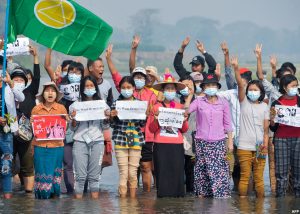More than a month after the coup in Myanmar, the dust kicked up by the military’s seizure of power is nowhere near settling. The people of Myanmar have overwhelmingly rejected the coup and are courageously defying what they consider the unjust and illegitimate orders imposed upon them by the newly formed State Administrative Council.
Since February 1, thousands of people have been arbitrarily detained by the coup government, their whereabouts in many cases unknown. More than 50 innocent civilians, mostly youth and students, have been killed and hundreds injured by the security forces to date. Myanmar is quickly devolving into chaos as the people — of all ages, nationalities, and professions — courageously stand up and reject the military coup. Angry and worried, the people of Myanmar refuse to accept the military dictatorship. Thousands of civil servants have joined the CDM, or the Civil Disobedience Movement. In many big cities across the country, tens of thousands of people continue to protest in any way that they can.
“Enough is enough. I don’t want to live under the military dictatorship,” a young protester from Yangon said, with a combination of sadness and defiance.
So far, there is no sign whatsoever that the military will heed their call, but the protesters are not showing any sign of giving up: many know this is the fight of a lifetime the outcome of which will affect a whole generation and a whole country. I, for one, am consistently amazed by the steadfastness, resourcefulness, and determination of these young protesters. Despite the use of lethal force by the military in an attempt to quell them, they seem very confident that the power of the people will eventually win. And, they know that ultimate sacrifice on their part is necessary if they want to change the course of their country’s development.
“There is no middle ground here,” explained one protest leader, who took part in the nationalities general strike in March 7 in Yangon. “We either win to free the country from the yoke of military dictatorship once and for all or we will have to live under the ruthless military regime for a long, long time.”
What gives us more hope is the fact that many of the young protesters are a lot more politically aware than we initially realized. Although the overwhelming majority of people on the streets initially started with calls for the release of State Counsellor Aung San Suu Kyi and President Win Myint, some clearly stood out among the protesters as they looking beyond a simple return to the pre-coup status quo. As Esther Ze Naw, an ethnic Kachin woman and one of those who started leading the anti-coup protests as early as on February 6, puts it: “This is the fight for our future, and the future of our country. We do not want to live under a military dictatorship. We want to establish a real federal Union, wherein all citizens, all ethnicities are treated equally.”
In the end, we believe that injustice will fail and justice must prevail. One has to hope that the determination and perseverance of the people of Myanmar will eventually pay off. The political desires of the people are clear: We must have the right to determine who we want to be governed by. Ethnic nationalities must have self-determination of their own. Everyone in the country must be accorded basic human rights.
While we understand that these are all the domestic affairs of the country, the international community, particularly our close neighbors, have an important role to play. We urge the regional bloc, the Association of Southeast Asian Nations (ASEAN), to not recognize the illegitimate military council and instead recognize representatives of the people as legitimate rulers of the country. Our hope is also that the People’s Republic of China stops worrying about its legitimate interests in the country and instead strives to protect its longer-term interests by aligning its foreign policy with the desire of the people and supporting the representative government of the people of Myanmar.
A democratic Myanmar governed by a duly elected, representative government will be a much more responsible member of ASEAN and a better partner of its two giant neighbors, China and India. It will also better be able to contribute to regional peace and security than a nation ruled by a powerful yet unpredictable military regime. The people of Myanmar, while protesting in the streets, are also reflecting and doing their own soul searching. It might be that they got caught off guard when they heard the news on February 1 that the leaders they had just voted for in the 2020 November elections had been detained and that the military had staged a coup. But, they know too well that it was the previous flawed system that had that allowed the military takeover in the first place. That is perhaps why they are so determined to risk their lives and join this struggle of a lifetime.
Zin Lin, an activist who joined the protest very early on, summed up the sentiments of his colleagues and how seriously they see this struggle: “We are not afraid. We know the risk we are taking,” he said.
“I don’t want to live and see our generation live under a fascist dictatorship. What we need is a real democratic constitution, a real democratic government, a new country. What is more important than our future and the future of our country?” Zin Lin’s question is real and rhetorical at the same time. Thousands of young people in Myanmar are out on the streets protesting not because they support any political party but they are keenly aware that this is the struggle for a new system, a new politics, and a new society.

































